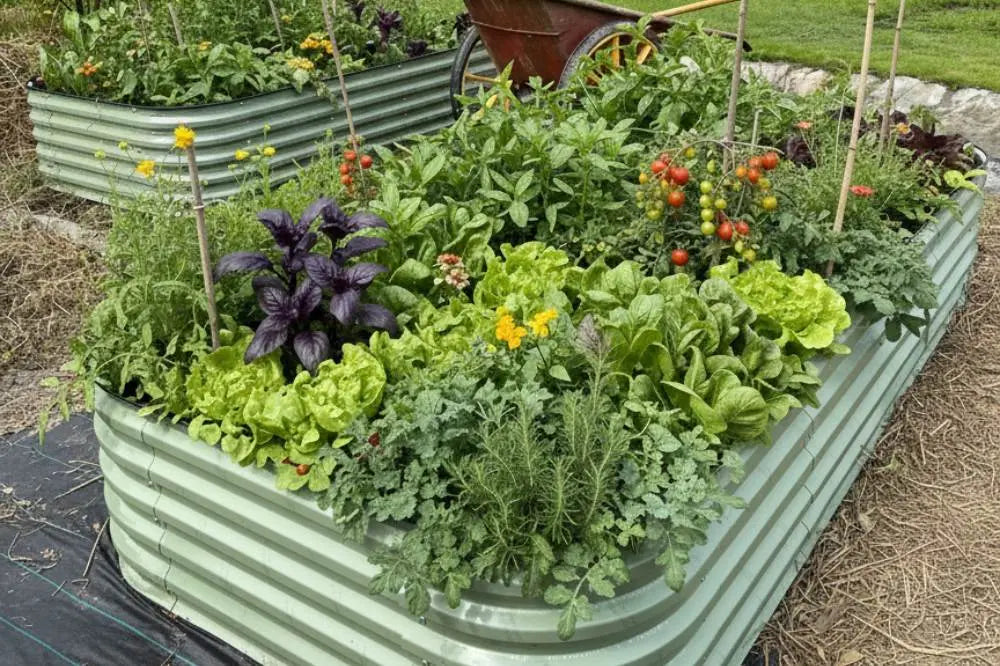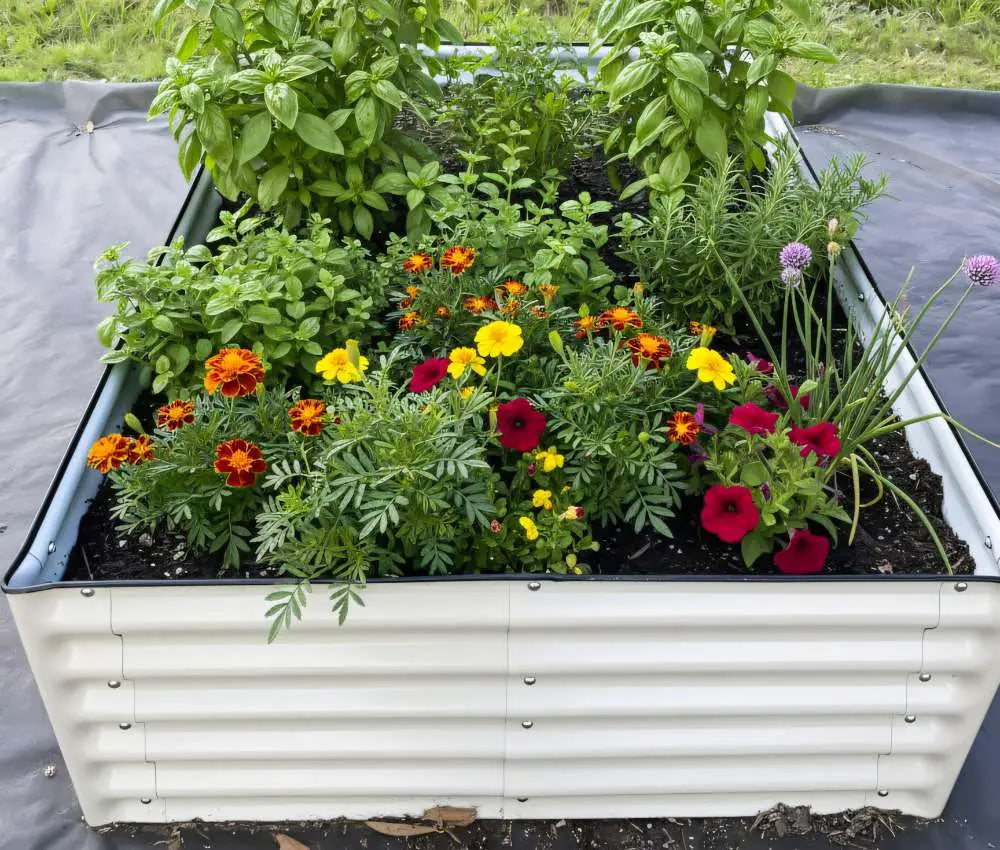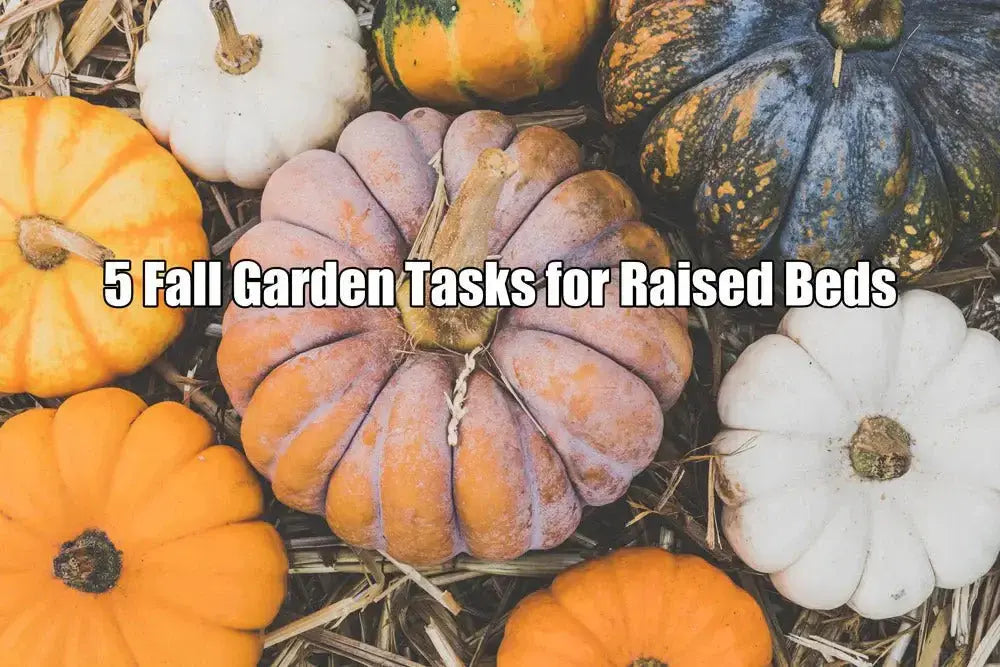5 Powerful Ways to Turn Kitchen Scraps into Natural Plant Fertilizer
Are you looking for a way to feed your plants without synthetic chemicals? The answer is likely already in your kitchen! Turning your food scraps into natural plant fertilizer is a win-win! We can reduce waste and create an organic food for our garden, easpecially for our metal raised garden beds. This guide will explore five effective methods to transform your everyday waste into "garden gold" for a healthier, more sustainable garden.
Why Recycle your Food Scraps?

Food waste is a major contributor to global greenhouse gas emissions. In fact, the United Nations estimates that one-third of all food produced for human consumption is lost or wasted annually. By recycling the food scraps into fertilizer, we can do our part to reduce food waste and its associated negative environmental impacts. Before we dive into the methods, let's understand why homemade plant food is superior. Unlike chemical alternatives, natural fertilizers:
- Improve Soil Health: They add organic matter, enhancing soil structure and water retention.
- Provide Slow-Release Nutrients: They feed plants steadily without the risk of root burn.
- Support a Healthy Ecosystem: They encourage beneficial microbes and worms in your soil.
- Are Cost-Effective & Sustainable: You save money and reduce your environmental footprint.
Turn Food Waste into Natural Plant Fertilizer in 5 Ways
1. Composting: The All-Purpose Soil Booster

One of the most straightforward ways to recycle your food waste as fertilizer is by composting. Composting is a natural process that involves breaking down organic matter into nutrient-rich soil, which can be used to fertilize plants and gardens.
To get started with composting, you’ll need a bin or container, soil, oxygen, and a mixture of green and brown materials.
Green materials are nitrogen-rich and include food scraps such as vegetable peelings, fruit cores, coffee grounds, and eggshells. Brown materials are carbon-rich and include dried leaves, newspaper, sawdust and wood chips.
Once you have your bin ready to go, you’ll need to add the green and brown materials in layers, alternating between the two. Make sure to sprinkle some soil over the top of each layer to help the decomposing process along.
Pro Tip: For faster results and easier management, consider a tumbling composter. It simplifies the turning process and can produce finished compost in as little as 4-6 weeks. By the way, some gardeners will choose to compost directly in metal raised beds. Let's check the details to build a Lasagna Garden Bed.
2. Vermicomposting: Creating Nutrient-Dense Superfood

Vermicomposting uses worms to create one of the most potent natural fertilizers available: worm castings. This method is excellent for small-scale composting.
Put red wiggler worms in a ventilated bin with shredded newspaper. Feed them small amounts of kitchen scraps. The worms will quickly process the waste into fine, odorless castings. And if you place a worm tower directly into your raised bed! The worms will work their magic right in the soil, providing continuous nutrients to your plants' root systems in garden beds.
Don't forget to add a handful of castings to planting holes or brew a powerful "compost tea" for watering.
In a few weeks or months, your worms will have broken down the organic matter into rich, nutrient-dense soil that can be used to fertilize your plants and garden.
3. Bokashi Fermentation: The Quick Indoor Solution

Bokashi is a fermentation process that pickles your food waste, including items like meat and dairy that shouldn't go in a regular compost bin. And it's an incredibly fast and space-efficient way to be the natural plant fertilizer.
It's easy to take Bokashi.
The first step is to layer food scraps in an airtight bucket and sprinkle with Bokashi bran (containing effective microorganisms). After about two weeks, the fermented waste can be buried in soil. You can bury the pre-composted waste in your garden beds. The liquid that drains off (Bokashi tea) is also a excellent, diluted liquid fertilizer that is a homemade organic fertilizer.
4. Compost Tea: Nutrient-Specific Fertilizer

Compost tea is a liquid fertilizer made by steeping compost in water overnight and then straining the mixture. This liquid can be used to fertilize your garden or indoor plants, as well as a preventative measure against plant diseases. You can create quick, targeted natural plant food by steeping specific scraps in water.
- Banana Peel Tea (Create Potassium): Soak banana peels in water for 2-3 days. Potassium is essential for flower and fruit development.
- Eggshell Water (Create Calcium): Soak crushed, rinsed eggshells in water for a week. Calcium helps prevent blossom end rot in tomatoes and peppers.
- Weed or Grass Clipping Tea (Create Nitrogen): Steep nutrient-rich weeds or grass clippings in water for a few days to create a nitrogen-boost for leafy greens.
But remember to dilute these teas until they look like weak iced tea before applying to your plants.
5. Direct Burying: The Simple Compost Method

For the ultimate low-effort approach to make the natural plant fertilizer, you can bury food scraps directly in your garden beds. This method doesn’t require any special equipment and is an excellent way to fertilize your garden without spending any money.
First, dig a trench or hole about 12 inches deep in your garden bed, so, if you are choosing metal raised beds, it's better to choose 17-inch or 32-inch tall garden beds. And then, add your kitchen scraps, and cover them with soil. The waste will decompose in place, enriching the soil right at the root level.
What are the Advantages and Disadvantages of Composting and Vermicomposting?
Composting is an easy way to recycle food scraps, and it doesn’t require any special equipment or tools, and takes relatively little time and effort. Additionally, composting can reduce the amount of waste sent to landfills and can help to improve soil structure and fertility in the raised beds.
Vermicomposting is an efficient way to recycle food waste, takes less time than traditional composting, and produces nutrient-dense fertilizer that is ideal for gardens or indoor plants. What's more, vermicomposting doesn’t require large amounts of space or as much stirring and maintenance as traditional composting.
The main disadvantage of both methods is that they take some time and effort to set up and maintain. Additionally, composting and vermicomposting can lead to unpleasant odours and attract unwanted pests if not managed properly.
Safety Tips for Your Homemade Fertilizers
To ensure your natural plant fertilizer is safe and effective:
- Avoid Contaminated Materials: Never add meat, dairy, oily foods, or pet waste to open compost systems, as they can attract pests and harbor pathogens.
- Achieve Proper Decomposition: Ensure your compost pile reaches a high enough temperature to kill weed seeds and pathogens. A well-managed, turned pile will achieve this.
Conclusion
Creating your own natural plant fertilizer from kitchen scraps is a rewarding step toward a truly organic garden. Whether you choose the steady pace of composting, the efficiency of vermicomposting, or the speed of Bokashi, you're making a positive impact on your garden and the planet. Ready to build the perfect fertilizer for your nutrient-rich plants? Pair your homemade fertilizers with a durable, deep-rooted Vegega metal raised garden bed for your most successful growing season yet!



